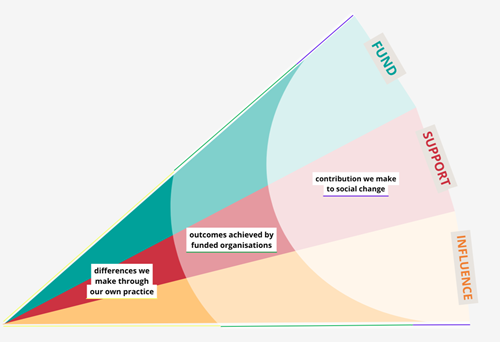Understanding Impact
Our Impact and Insights Framework (IIF) helps us to understand the differences that we are contributing to and to make informed decisions about where we could have the biggest impact on poverty and trauma in Scotland.

Our Mission is to prevent and reduce poverty and trauma in Scotland: funding, supporting, and influencing solutions to drive social change.
This means we aim to do more than fund charities to alleviate the worst impacts of poverty and trauma. It has important implications for what we do across the three Objectives that define our work: to fund, support, and influence.
We, alongside other Open and Trusting Grantmakers, are deeply committed to understanding our contribution to impact and working out how to improve it. We have developed our approach gradually, testing and refining as we go, in order to establish our IIF with confidence, build our practice as a learning organisation and use valuable evidence and insights to drive decision making.
The purpose of our IIF is to:
- Understand what we do and how we do it.
- Enable us to use insights to shape our work and drive decision-making.
- Improve our impact on poverty and trauma in Scotland.
We aim to recognise and manage the balance between seeking assurance about impact and adapting in the face of uncertainty in pursuit of social change. We have developed our IIF to sharpen the line of sight between the change we want to see in Scotland and the contribution we make with our partners. Through the development of a comprehensive and rigorous framework, we are building on the approaches we have tested so far to gather and make sense of meaningful data, drive a strategic learning cycle, and apply evidence and insights to improve our practice and strategic decision-making.
Read on to find out more details about our IIF.
We have identified five key principles that underpin our Framework:

Our IIF draws a line of sight between the change we want to see in Scotland and the contribution we make across our work.
Through it, we want to understand:
- The difference we make through our own practice as a funder and through our support and influence objectives.
- The outcomes achieved by funded organisations.
- The contribution we make to social change.

We also want to contribute to solutions that break the cycle between deep, persistent poverty and intergenerational trauma. To do this, we need to address the material and relational impacts of poverty and trauma together. Our Themes, and the connections between them, recognise that to reduce and prevent poverty and trauma we need to build:
- Financial Security
- Nurturing Relationships
- Education Pathways
- Work Pathways
Every quarter, we will provide a deep dive for one of our themes based on: analysis of external evaluations and end-of-year reports; external evidence (such as national data publications and research reports); and a collective sense-making event including grant holders, staff, external advisors, and trustees.
The deep dive analysis aims to explore:
- Challenges and opportunities in the system.
- What we are learning about outcomes achieved.
- What that means for what we should do more/less of, stop/start.
We commit to sharing our quarterly insights reports and communicating through diverse and accessible platforms, including our website, annual reports, and our social media.
Central to this approach is clarity about the outcomes we want to contribute to through our strategy. We recognise that while tackling poverty means people on low incomes having more money in their pockets through higher earnings, social security, and reduced costs and debt, addressing the financial aspects alone is not enough. Even if we were able to move everyone above the poverty line in financial terms, we know some effects of poverty would persist.
The following Aims and Outcomes for each Theme set out what we want to contribute to delivering for Scotland.
We are proposing that these last until the end of 2030 (in line with the ten-year strategy period) and are relevant across our work to fund (including Our Funds from Small Grants up and Programmes), support, and influence.
*Note: for all Outcomes, the focus is on low-income people (individuals, families, households and groups) and places.
|
Aims: |
Outcomes: |
|
Financial Security |
|
|
We want to see a Scotland where people are financially secure and able to live free of poverty and poverty-related trauma. We want to support greater income adequacy and security, reduced cost of living pressure, and strengthened safety nets to ensure people are lifted out of and do not fall into poverty. |
FS1. Improving income adequacy. FS2. Strengthening income security. FS3. Ensuring the costs of essentials are affordable and predictable. FS4. Improving financial safety nets. |
|
Nurturing Relationships |
|
|
We want to see a Scotland where people, families and communities can thrive and not be trapped in cycles of poverty and trauma. We want to support nurturing relationships within families and communities to help prevent, and support recovery from, trauma. |
NR1. Reducing and preventing trauma among families. NR2. Reducing and preventing trauma for individuals. NR3. Reducing and preventing trauma in place-based communities. NR4. Reducing and preventing the impact of trauma within specific population groups. |
|
Education Pathways |
|
|
We want to see an education system in Scotland which acts as a pathway out of poverty. We want to support solutions which enable those experiencing poverty and trauma to access and participate in education, developing skills, capabilities, resilience and achievements that will help them thrive. |
EP1. Improving attainment and development. EP2. Improving engagement in education, learning and/or training. EP3. Improving access to education, retention and success rates. EP4. Encouraging and increasing parental/guardian engagement in education and learning. |
|
Work Pathways |
|
|
We want to see a Scotland where paid work is a more reliable route out of poverty. We want to contribute to tackling the drivers of in-work poverty and to removing barriers so that more people can access fair work. |
WP1. Improving sustained employment rates. WP2. Improving pay, hours and earnings. WP3. Improving the quality of work - including autonomy, security, flexibility and well-being. WP4. Strengthening worker rights, enforcement and improving employment practices. |
